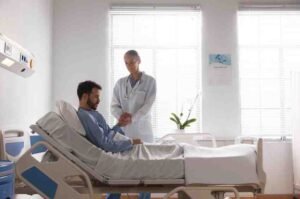I. Introduction
Essential to a medical education are clinical rotations and internships, which provide students with practical patient care experience and exposure to a range of medical specialties. With its rapidly developing healthcare system and rich cultural legacy, China offers a singularly enriching experience for clinical practice and education. The chance to study in China broadens medical knowledge and exposes students to a variety of treatment modalities and healthcare administration techniques. This is especially true for those studying an MBBS in China. Medical students who participate in these programs in China have a thorough awareness of global health views and are better prepared for a variety of medical vocations in a world where connectivity is growing.
II The Healthcare System in China
China now boasts one of the biggest and most complicated healthcare systems in the world, the result of substantial changes. China’s hospitals and clinics are essential to the country’s medical school system because they give students real-world experience that is essential to their education. The MBBS in China offers a distinctive learning curve for international medical students and is a unique blend of Eastern and Western medical knowledge, in contrast to Western healthcare systems. This is because China’s approach integrates modern medical procedures with traditional Chinese medicine. This combined approach enhances learning and gives students transferable abilities that they may use in a variety of healthcare environments.
III. Possibilities for Students from Other Countries
China offers a wide range of clinical rotation and internship options to overseas students in its extensive network of hospitals, which includes both public and commercial establishments as well as those that specialize in traditional Chinese medicine. The integration of overseas students into the Chinese medical education system is further facilitated by special programs and partnerships with foreign medical schools, which attracts students from all over the world to pursue an MBBS in China. These programs demonstrate China’s dedication to international medical education and its role in preparing the next wave of medical professionals.
IV. Procedure for Applications
Applying for clinical rotations and internships in Chinese hospitals entails fulfilling standard prerequisites in academics, language skills, and visa policies. Candidates must carefully prepare all required paperwork. It is recommended that prospective students conduct thorough research and speak with educational experts or the hospitals of their choice for advice on how to effectively navigate the application process. In order to make the most of the educational opportunities and ensure a seamless transfer into the Chinese medical system, this preparation is essential.
V. Cultural and Linguistic Aspects
Being able to communicate well in Mandarin is generally necessary if you want to take part in clinical rotations in China and interact with patients and medical professionals. International students may not be familiar with the cultural intricacies of the patient-doctor relationship and medical practices in China. A successful learning process depends on proactive methods for overcoming linguistic barriers as well as an understanding and respect of these disparities. Immersion in the language and culture fosters comprehension of Chinese society and promotes professional contacts in addition to personal development.
VI. Domains of Expertise
Chinese hospitals are world-famous for their superiority in a wide range of medical specialties, such as infectious diseases, surgery, and traditional Chinese medicine. These fields of study provide foreign students with exceptional chances for research and education, enhancing their time as students in China and offering insightful knowledge of both conventional and alternative medicine. A well-rounded medical education is facilitated by the exposure to a broad range of specializations, which empowers students to make well-informed judgments regarding their future career options.
VII Practical Considerations for Internships and Clinical Rotations
Students are exposed to a broad range of tasks during clinical rotations and internships in Chinese hospitals, including patient care and medical research. International students should be prepared for a variety of medical contexts by adjusting to working hours, supervision, and living arrangements that may differ from those in their native countries. This practical experience is vital as it fosters resilience and adaptation while providing a real-world peek into the rewards and pitfalls of a career in medicine.
VIII. China’s Clinical Rotations and Internships: Advantages
Medical students can learn about alternative medical practices, get exposure to a wide range of diseases and medical problems, and broaden their view on healthcare globally by participating in clinical rotations and internships in China. Building a professional network and developing a thorough awareness of the issues pertaining to global health are greatly aided by these experiences. Additionally, the distinctive healthcare environment in China fosters critical thinking and creative problem-solving abilities, which are crucial for aspiring medical professionals.
IX. Difficulties and Solutions
Language obstacles, cultural disparities, and adjusting to the regional healthcare system are some of the difficulties that overseas students may encounter. One can significantly improve the learning process by actively participating in cultural exchange, asking peers and mentors for guidance, and accepting these obstacles with an open mind. Overcoming these obstacles enhances the learning process and promotes resilience and personal development, both of which are critical traits in the medical field.
X. Achievements
After completing their clinical rotations and internships in Chinese hospitals with success, a large number of international students have gone on to seek fulfilling careers in medicine. Future students thinking about pursuing an MBBS in China might draw inspiration and encouragement from their success stories and advice. These stories demonstrate the life-changing effects of study in China and the potential that exists for those who are open to taking advantage of the chances and challenges presented by an international medical education.
XI. Conclusion
Completing clinical rotations and internships in China presents a variety of challenging and unique learning experiences. China provides a great opportunity for both professional and personal development for medical students pursuing an all-encompassing education covering both traditional and modern medical techniques. These programs prepare students for a successful and rewarding future in medicine by developing a strong grasp of global healthcare as well as improving clinical abilities.
